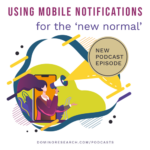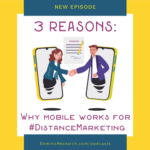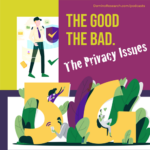
Mobile Wallet Marketing Made Easy Podcast
All episodes are now available online, free of charge
A successful podcast with nearly 120 episodes, Mobile Wallet Marketing Made Easy was produced for nearly five years.
The primary focus of the mobile marketing podcast is how small to mid-sized business owners (SMBs) can utilize simple, inexpensive, and effective mobile wallet apps as marketing machines; these apps offer unprecedented access to customers and prospects for a nearly unlimited amount of time – and at a much higher ROI and lower acquistion cost than comparable campaigns.
The podcast identifies specific industries – such as real estate, online coaching, events management, etc – that can most effectively use mobile marketing, and then offers case studies and real world examples of how to best approach and implement these ideas to grow revenue, increase ticket sizes, and stay relevant in the minds of current and prospective customers.
Episodes remain online and freely available for listening at the current time.
Digital Hustle: Networking at Virtual Conferences (ep 117)

Show Notes | Episode 117 | Digital Hustle: Networking at Virtual Events | Episode Link URL – https://dominoresearch.com/podcast/digital-hustle |
Mastering the art of the digital hustle just takes a little bit of planning and preparation, so get it done before you start networking at the next virtual event you are attending.
The New Normal: One Idea for Restarting Your Small Business (ep 116)

Show Notes | Episode 116 | Using Mobile Notifications to Ease Customers into the ‘New Normal’ | Episode Link URL – https://dominoresearch.com/podcast/new-normal |
Mobile notifications are a targeted way to successfully ease customers back into patronizing your business for what passes as the ‘new normal’.
Restaurant Delivery Apps in the Coronavirus Era (ep 115)

Show Notes | Episode 115 | Restaurant Delivery Apps in the Coronavirus Era | Episode Link URL – https://dominoresearch.com/podcast/restaurant-delivery-apps |
Restaurant delivery apps are all the rage, but are they actually helping restaurant owners and workers or are they just in it for themselves?
Distance Marketing: 3 Reasons Why Mobile Works (ep 114)

Show Notes | Episode 114 | 3 Reasons: Why Mobile Works for Distance Marketing| Episode Link URL – https://dominoresearch.com/podcast/3-reasons-distance-marketing |
In our strange new reality, #DistanceMarketing is the new normal. Learn to use it to grow your business.
The Emoji Factor Returns (ep 113)

Show Notes | Episode 11 | The Emoji Factor Returns | Episode Link URL – https://dominoresearch.com/podcast/emoji-factor-returns |
Emojis are coming on stronger than ever before – they’ve invaded our DMs, posts, texts, and our lives! Where do they come from and what do they mean?
Mobile Reach: Marketing in a New Era (ep 112)

Show Notes | Episode 112 | Mobile Reach: Marketing in a New Era | Episode Link URL – https://dominoresearch.com/podcast/mobile-reach |
With the corona virus in full swing since our last episode, we’re talking about how to leverage mobile to create a more hands off, yet meaningful, relationship with customers and prospects. Welcome to the era of #distancemarketing.
The State of Retail 2020 – March Numbers are In (ep 111)

Show Notes | Episode 111 | The State of Retail 2020 | Episode Link URL – https://dominoresearch.com/podcast/state-of-retail-2020 |
Hazel weighs in this week with some new numbers and a few thoughts about the NRF Big Show. Listen to The State of Retail 2020 and find out more.
Google Easter Eggs? Not Exactly A Bakers Dozen. (ep 110)

Show Notes | Episode 110 | Google’s Not So Easter Eggs | Episode Link URL – https://dominoresearch.com/podcast/google-easter-eggs |
Kim was recently playing around on Google (or more accurately procrastinating) when she stumbled into a few neat tricks that aren’t exactly Easter Eggs.
5G – The Good, the Bad, and the Privacy Issues (ep 109)

Show Notes | Episode 109 | 5G – The Good, the Bad, and the Privacy Issues | Episode Link URL – https://dominoresearch.com/podcast/5g-good-bad-privacy-issues |
The imminent arrival of 5G internet connectivity is being heralded as a game changer for many industries. Will your privacy survive though?
Weird Ad Campaigns from Top Brands (ep 108)

Show Notes | Episode 108 | Weird Ad, Marketing & Branding Campaigns | Episode Link URL – https://dominoresearch.com/podcast/weird-ad-campaigns-top-brands |
Today we are talking through some examples of weird ad campaigns from some of the top brands and agencies – join us for a laugh!
The Dark Side of Influencer Marketing (ep 107)

Show Notes | Episode 107 | The Dark Side of Influencer Marketing | Episode Link URL – https://dominoresearch.com/podcast/dark-side-influencer-marketing |
Welcome to our first new episode of the new decade! Today we are talking about successfully using influencer marketing, and how you can help protect yourself from fraud if you choose to participate.
Retail Challenges, the “Best of” Episodes – (ep 106)

Show Notes | Episode 106 | Retail Challenges: “Best of” Episodes | Episode Link URL – https://dominoresearch.com/podcast/retail-challenges-106 |
We’re starting off the new year (and new decade!) with a fantastic primer on using mobile ads in your retail business. Listen to clips from three of the best retail marketing episodes in the archives!
Proximity Marketing: “Best of” Episodes – (ep 105)

Show Notes | Episode 105 | Best of Proximity Marketing Episodes | Episode Link URL – https://dominoresearch.com/podcast/proximity-marketing-best-105 |
We’ve pulled together a compilation of clips from some of our best proximity marketing episodes!
Our Favorite Mobile Marketing Blogs (ep 104)

Show Notes | Episode 104 | Our Favorite Mobile Marketing Blogs | Episode Link URL – https://dominoresearch.com/podcast/favorite-mobile-marketing-blogs |
Heading into the holidays, we’re giving you a list of our favorite mobile marketing blogs. Take a few minutes and check them out!
Our Favorite Podcasts for Event Planners (ep 103)

Show Notes | Episode 103 | Our Favorite Podcasts for Event Planners | Episode Link URL – https://dominoresearch.com/podcast/favorite-podcasts-event-planners |
We picked our favorite podcasts for event planners and we’re giving you the details in the latest episode of our podcast!
Canadian Cannabis After One Year of Legalization (ep 102)

Show Notes | Episode 102 | Canadian Cannabis: 12 Months After Adult Use Legalization | Episode Link URL – https://dominoresearch.com/podcast/canadian-cannabis-one-year-legalization |
Has it really been a full year since Canadian cannabis for adult use was legalized? What’s happening with the state of affairs in the country now? Catch our update right here!
Negotiating Event Venues, Part 2 (ep 101)

Show Notes | Episode 101 | Negotiating Your Event Venue, part 2 | Episode Link URL – https://dominoresearch.com/podcast/negotiating-event-venues-part-2 |
We’re back with part 2 in our mini-series – Negotiating Event Venues – get the rest of the story on how to work with your venue to squeeze the best prices on services and location!
18 Days in Instagram Jail (ep 100)

Show Notes | Episode 100 | 18 Days in Instagram Jail | Episode Link URL – https://dominoresearch.com/podcast/instagram-jail |
Help! We spent 18 days in Instagram Jail recently! What do you do when you are action blocked? Even Instagram and Facebook aren’t sure. Listen to our story now –
Your Event Venue: How To Negotiate A Deal, Part 1 (ep 99)

Show Notes | Episode 99 | How To: Negotiate for Your Event Venue, Part 1 | Episode Link URL – https://dominoresearch.com/podcast/negotiate-event-venue-part-1 |
It’s up to you to negotiate for your event venue. There are a lot of ways to decrease costs or increase the level of service you’ll receive.
Favorite Maker Podcasts for Artists & Creatives (ep 98)

Show Notes | Episode 98 | Favorite Podcasts for Makers, Artists & Creatives | Episode Link URL – https://dominoresearch.com/podcast/favorite-podcasts-makers-artists-creatives |
Tune in to the latest episode as we detail our favorite podcasts for makers, artists, and creatives! Find out why we like them and what’s so great about them.
CBD Industry – It’s the Wild West Out Here (ep 97)

Show Notes | Episode 97 | CBD Industry Turns Into Wild West | Episode Link URL – https://dominoresearch.com/podcast/cbd-industry-wild-west |
The CBD industry in the US has become more like the wild west than an industry on the upswing. Regulations and enforcement are sure to increase.
Savviest Realtor Marketing During a Down Market (ep 96)

Show Notes | Episode 97 | Realtor Marketing When the Market is Down | Episode Link URL – https://dominoresearch.com/podcast/realtor-marketing-down-market |
When the market takes a turn for the worse, realtor marketing takes on a whole new set of challenges. Find out how to prepare early for the extra workload.
CBD Is a Drug! Be Careful What You Wish For… (ep 95)

Show Notes | Episode 95 | CBD is a Drug Now, According to the FDA | Episode Link URL – https://dominoresearch.com/podcast/cbd-drug|
CBD is now officially a drug, and this is creating any number of problems, but it really offers a preview of where we may be going with THC products. This will not end well for any number of companies, and perhaps a very large segment of the cannabis industry.
“Best of” Series – Podcast Promoting (ep 94)

Show Notes | Episode 94 | Best of Podcast Promoting| Episode Link URL – https://dominoresearch.com/podcast/best-podcast-promoting
It’s time for another episode and today we’re serving up a healthy dose of clips from some of our best podcast promoting ideas conversations!
“Best of” series – Best Online Coaching Episodes (ep 93)

Show Notes | Episode 93 | “Best of” Series – Online Coaching and Courses, part 1 | Episode Link URL – https://dominoresearch.com/podcast/best-online-coaching-episodes |
We’re back with another “best of” series – this time it’s Online Coaching episodes. Listen to highlights from prior episodes to find out what really works.
Best Real Estate Marketing Episodes (ep 92)

Show Notes | Episode 92 | Best of Real Estate Marketing Episodes | Episode Link URL – https://dominoresearch.com/podcast/best-real-estate-marketing-episodes
Welcome back! Today we’re pulling out highlights from some of our best real estate marketing episodes –
6 Strange Podcasts You Probably Haven’t Heard of (Yet) (ep 91)

Show Notes | Episode 91 | 6 Strange Podcasts You Probably Haven’t Heard of (Yet) | Episode Link URL – https://dominoresearch.com/podcast/6-strange-podcasts
If you ever wondered what kind of strange podcasts might be out in the wild, now’s your chance to find out about six of them. Yep, we did the research for you.
Hospitality Industry Takes Advantage of Mobile Marketing (ep 90)

Show Notes | Episode 90 | Hospitality Industry Takes Advantage of Mobile Marketing | Episode Link URL – https://dominoresearch.com/podcast/hospitality-industry-mobile-marketing
Smart hospitality industry owners use mobile messaging to fill seats, sell specials, and keep the liquor flowing!
Realtor Open Houses Use iBeacons to Generate Excitement (ep 89)

Show Notes | Episode 89 | iBeacons Generate Excitement at Open Houses | Episode Link URL – https://dominoresearch.com/podcast/ibeacons-generate-excitement-open-houses |
Looking to maximize engagement and interaction at your realtor open houses? We recommend iBeacons to draw attention to features and highlights.
Effective Podcast Marketing for Beginners (ep 88)

Show Notes | Episode 88 | Podcast Marketing for Beginners | Episode Link URL – https://dominoresearch.com/podcast/podcast-marketing-for-beginners-88
It’s time for another episode of the podcast, and today we are going to be talking about podcast marketing for beginners.
Auto Dealers Increase Engagement to Expand Customer Relationships (ep 86)

Show Notes | Episode 86 | Auto Dealers Increase Engagement to Expand Customer Relationships | Episode Link URL – https://dominoresearch.com/podcast/auto-dealers-increase-engagement |
With increasing disruption in the new car industry, smart dealers are increasing engagement now in order to cement strong customer relationships for the future.
Mobile Coupons Make Great Restaurants Prosper (ep 85)

Show Notes | Episode 85 | Restaurants Prosper by Using Mobile for Programs | Episode Link URL – https://dominoresearch.com/podcast/restaurants-prosper-mobile-coupons-loyalty-rewards |
Restaurants who use mobile coupons, loyalty and rewards see greater engagement, higher per ticket, and more sales than those who have no mobile communication with clientele.
Broker Open Houses: Do They Work – Or Is It Just a Party? (ep 84)

Show Notes | Episode 84 | Broker Open Houses: Worth It or Just a House Party? | Episode Link URL – https://dominoresearch.com/podcast/broker-open-houses |
Broker open houses, or caravans, are a love it or leave it line item for most folks in the real estate industry. Are these weekly get togethers actually worth the time or is it just a party?
Crafting Your Story: Compel Shoppers to Become Buyers (ep 83)

Show Notes | Episode 83 | Crafting Your Story: Compel Shoppers to Become Buyers | Episode Link URL – https://dominoresearch.com/podcast/crafting-your-story-compel-shoppers-to-become-buyers |
Compelling shoppers to become buyers relies upon the use of a well crafted story – one that accurately reflects who you and your company are and what you have to offer prospective customers.
California Legalization Means Falling Profits for Cannabis Companies (ep 82)

Show Notes | Episode 82 | California Legalization Means Falling Profits for Cannabis Companies | Episode Link URL – https://dominoresearch.com/podcast/california-legalization-falling-profits-cannabis |
California legalization of adult use cannabis is leaving many licensed cannabis industry business owners feeling the cost, in the form of falling profits.
Mobile Notifications Fill in the Gap at Events (ep 81)

Show Notes | Episode 81 | Mobile Notifications Fill in the Gap at Events | Episode Link URL – https://dominoresearch.com/podcast/mobile-notifications-fill-gap-events |
Mobile notifications are an easy way to keep things on track at your events, and to promote your next event to alumni attendees.
